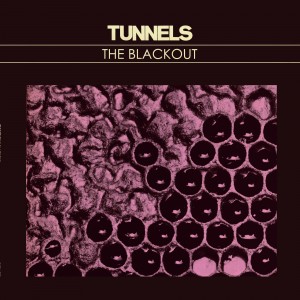Riffs, Rants & Rumors: Tunnels To Dark Places
posted in: Artist Features • Music News • Rock
 While there’s no denying the appeal of music that operates on an instant-gratification level, offering tricked-up tunes full of carefully baited hooks, in the end the albums that really stick with you will almost always be the ones that provide a truly immersive experience. That’s the way it is with The Blackout, the latest release from Tunnels. It’s a record that unfurls its sonic secrets slowly and purposefully, setting a darkly dreamy mood that feels perfectly suited to sweaty, sluggish summer nights, which is ironic, considering that it’s inspired chiefly by the emotionally chilly musical subgenre colloquially known as cold wave.
While there’s no denying the appeal of music that operates on an instant-gratification level, offering tricked-up tunes full of carefully baited hooks, in the end the albums that really stick with you will almost always be the ones that provide a truly immersive experience. That’s the way it is with The Blackout, the latest release from Tunnels. It’s a record that unfurls its sonic secrets slowly and purposefully, setting a darkly dreamy mood that feels perfectly suited to sweaty, sluggish summer nights, which is ironic, considering that it’s inspired chiefly by the emotionally chilly musical subgenre colloquially known as cold wave.
 Nicholas Bindeman is the man from whom all the sounds on The Blackout emerge. The multi-talented Oregonian is seemingly too young to have experienced cold wave’s heyday first-hand, when its perfect 1980s storm of synth pop and post punk blended into an effectively overcast vision of new wave’s dark underbelly. But that hasn’t stopped him from assimilating those sounds into his own music. Pressed for specifics, he rattles off a list of synth-toting ˜80s cult heroes that you just know is only the tip of his inspirational iceberg. Crash Course in Science, Charles de Goal, Martin Rev, Snowy Red, Tuxedomoon, Jeff and Jane Hudson, blah blah blah, it just goes on, he exclaims. I do truly love the music from that era, and while it’s not exactly an original influence these days, it is what it is, the collective unconscious has spoken.
Nicholas Bindeman is the man from whom all the sounds on The Blackout emerge. The multi-talented Oregonian is seemingly too young to have experienced cold wave’s heyday first-hand, when its perfect 1980s storm of synth pop and post punk blended into an effectively overcast vision of new wave’s dark underbelly. But that hasn’t stopped him from assimilating those sounds into his own music. Pressed for specifics, he rattles off a list of synth-toting ˜80s cult heroes that you just know is only the tip of his inspirational iceberg. Crash Course in Science, Charles de Goal, Martin Rev, Snowy Red, Tuxedomoon, Jeff and Jane Hudson, blah blah blah, it just goes on, he exclaims. I do truly love the music from that era, and while it’s not exactly an original influence these days, it is what it is, the collective unconscious has spoken.
The abject-but-accessible vibe that permeates many of the tracks on Bindeman’s album has as much to do with his own sensibility as his record collection, though. There’s a element of myself on there that can’t really be attributed to any specific influence, he asserts, something nocturnal, something slightly cold and melodramatic. And from the disembodied-sounding, electronically processed vocals on opening track Crystal Arms to the memorably misanthropic Gary Numanisms of How I Hate You and the deliciously creepy, Pornography-era Cure feel of the bass and guitar lines on Dead Ringers, The Blackout duly weaves its mournfully magical spell, pulling you effortlessly along in its eerie, electronic undertow.
 The ironic thing is that even though Bindeman excels at this musical mode, and sounds like he’s been living in this sonic space all his life, it’s actually a new direction for him. The sounds he has created under the Tunnels moniker up to now have been of an entirely different bent, often finding him knee-deep in avant-garde improvisation or freewheeling psychedelic instrumentals. I’ve always found it impossible to make music one way and just that way, explains Bindeman. [While I was ] Growing up, my father listened to a wide range of”little did I know at the time”fucked-up music, from The Residents to Pink Floyd, from Merzbow to Springsteen. Naturally, this musical Skinner box had an effect on Bindeman’s earliest artistic endeavors. When I first started four-tracking music at age eighteen I was trying to make The Beach Boys-meets-Trans Am, or some other weird-ass thing that didn’t quite work, he recalls. Fast-forward a few years: I’ve realized the joys of [effects] pedal magic, drugs and improvisation, in no particular order. Beginning in the late ˜90s, for several years I did nothing but record new age music with Casios, delays and filters¦a very private affair that was scarcely shared with others. That slowly developed into a more hippy-dippy, freak-out sound with oodles of shaky hand drums, clanging bells and fried guitars, a recorded aesthetic that lasted up until a few years ago.
The ironic thing is that even though Bindeman excels at this musical mode, and sounds like he’s been living in this sonic space all his life, it’s actually a new direction for him. The sounds he has created under the Tunnels moniker up to now have been of an entirely different bent, often finding him knee-deep in avant-garde improvisation or freewheeling psychedelic instrumentals. I’ve always found it impossible to make music one way and just that way, explains Bindeman. [While I was ] Growing up, my father listened to a wide range of”little did I know at the time”fucked-up music, from The Residents to Pink Floyd, from Merzbow to Springsteen. Naturally, this musical Skinner box had an effect on Bindeman’s earliest artistic endeavors. When I first started four-tracking music at age eighteen I was trying to make The Beach Boys-meets-Trans Am, or some other weird-ass thing that didn’t quite work, he recalls. Fast-forward a few years: I’ve realized the joys of [effects] pedal magic, drugs and improvisation, in no particular order. Beginning in the late ˜90s, for several years I did nothing but record new age music with Casios, delays and filters¦a very private affair that was scarcely shared with others. That slowly developed into a more hippy-dippy, freak-out sound with oodles of shaky hand drums, clanging bells and fried guitars, a recorded aesthetic that lasted up until a few years ago.
That’s quite a change from the precision-tooled, tightly structured tracks that make up The Blackout. How did this drastic evolution occur? A few years ago, I began playing and recording songs that, while pop-based, were still pretty open-ended in terms of structure, says Bindeman. Soon they started taking on more of a concrete shape, and before you know it, I’m making pop music! Musing on his current penchant for synthesized sounds, he says, Perhaps something in the timbres themselves causes something inside me to twitch just the right way. I’ve always loved the control involved with synths, the subtlety of colors that can occur with pure chance and the sheer beauty they can provide with the gentlest of movements, so, in some ways this album was inevitable for me. Not to mention, the structure’s a nice contrast to playing in other groups that basically only improvise!
Oh, that’s right”did we forget to mention that besides being a one-man band with several full-length recordings to his credit, Bindeman has also found time to play with a number of other bands? Eternal Tapestry is for sure the most regular project going at the moment, he says. In March, these spacey, psychedelic explorers released Beyond The 4th Door on Thrill Jockey, the same label that has given The Blackout a home, as well as the new release Night Gallery, a collaboration between ET and Sun Araw. Bindman also plays with the renowned, colorfully-named experimentalists Jackie-O Motherfucker, whose Earth Sound System is out now on Fire Records. So, in effect, The Blackout could be seen as a side project for Bindeman, a sort of busman’s holiday from his work with Eternal Tapestry. While his plans for touring in support of his Tunnels work remain uncertain, he’s got an active agenda with Eternal Tapestry. We’re doing a tour of the east coast and Europe through October into November, he says, being careful to add that he and his bandmates still keep their priorities straight no matter how full their calendar becomes. We get together once a week or so and play and record or go swimming in the Washougal River; for us practice becomes less of priority with the beautiful and elusive Oregon summer in effect!
